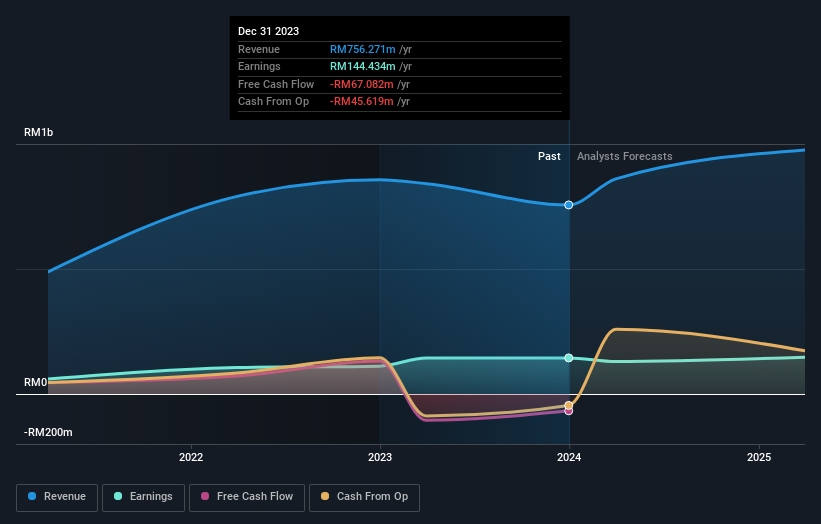SkyWorld Development Berhad (KLSE:SKYWLD) insiders have significant skin in the game with 67% ownership
Key Insights
Significant insider control over SkyWorld Development Berhad implies vested interests in company growth
53% of the business is held by the top 2 shareholders
Ownership research, combined with past performance data can help provide a good understanding of opportunities in a stock
A look at the shareholders of SkyWorld Development Berhad (KLSE:SKYWLD) can tell us which group is most powerful. With 67% stake, individual insiders possess the maximum shares in the company. That is, the group stands to benefit the most if the stock rises (or lose the most if there is a downturn).
With such a notable stake in the company, insiders would be highly incentivised to make value accretive decisions.
Let's delve deeper into each type of owner of SkyWorld Development Berhad, beginning with the chart below.
View our latest analysis for SkyWorld Development Berhad
What Does The Institutional Ownership Tell Us About SkyWorld Development Berhad?
Institutions typically measure themselves against a benchmark when reporting to their own investors, so they often become more enthusiastic about a stock once it's included in a major index. We would expect most companies to have some institutions on the register, especially if they are growing.
SkyWorld Development Berhad already has institutions on the share registry. Indeed, they own a respectable stake in the company. This implies the analysts working for those institutions have looked at the stock and they like it. But just like anyone else, they could be wrong. When multiple institutions own a stock, there's always a risk that they are in a 'crowded trade'. When such a trade goes wrong, multiple parties may compete to sell stock fast. This risk is higher in a company without a history of growth. You can see SkyWorld Development Berhad's historic earnings and revenue below, but keep in mind there's always more to the story.
Hedge funds don't have many shares in SkyWorld Development Berhad. Because actions speak louder than words, we consider it a good sign when insiders own a significant stake in a company. In SkyWorld Development Berhad's case, its Top Key Executive, Thien Ng, is the largest shareholder, holding 42% of shares outstanding. Soo Lam is the second largest shareholder owning 10% of common stock, and Chee Lee holds about 5.0% of the company stock. Note that two of the top three shareholders are also Senior Key Executive and Member of the Board of Directors, respectively, once again pointing to significant ownership by company insiders.
After doing some more digging, we found that the top 2 shareholders collectively control more than half of the company's shares, implying that they have considerable power to influence the company's decisions.
While studying institutional ownership for a company can add value to your research, it is also a good practice to research analyst recommendations to get a deeper understand of a stock's expected performance. There is some analyst coverage of the stock, but it could still become more well known, with time.
Insider Ownership Of SkyWorld Development Berhad
The definition of company insiders can be subjective and does vary between jurisdictions. Our data reflects individual insiders, capturing board members at the very least. Management ultimately answers to the board. However, it is not uncommon for managers to be executive board members, especially if they are a founder or the CEO.
Insider ownership is positive when it signals leadership are thinking like the true owners of the company. However, high insider ownership can also give immense power to a small group within the company. This can be negative in some circumstances.
Our information suggests that insiders own more than half of SkyWorld Development Berhad. This gives them effective control of the company. So they have a RM401m stake in this RM595m business. Most would be pleased to see the board is investing alongside them. You may wish todiscover (for free) if they have been buying or selling.
General Public Ownership
The general public-- including retail investors -- own 22% stake in the company, and hence can't easily be ignored. While this size of ownership may not be enough to sway a policy decision in their favour, they can still make a collective impact on company policies.
Next Steps:
While it is well worth considering the different groups that own a company, there are other factors that are even more important. For example, we've discovered 2 warning signs for SkyWorld Development Berhad (1 is potentially serious!) that you should be aware of before investing here.
If you would prefer discover what analysts are predicting in terms of future growth, do not miss this free report on analyst forecasts.
NB: Figures in this article are calculated using data from the last twelve months, which refer to the 12-month period ending on the last date of the month the financial statement is dated. This may not be consistent with full year annual report figures.
Have feedback on this article? Concerned about the content? Get in touch with us directly. Alternatively, email editorial-team (at) simplywallst.com.
This article by Simply Wall St is general in nature. We provide commentary based on historical data and analyst forecasts only using an unbiased methodology and our articles are not intended to be financial advice. It does not constitute a recommendation to buy or sell any stock, and does not take account of your objectives, or your financial situation. We aim to bring you long-term focused analysis driven by fundamental data. Note that our analysis may not factor in the latest price-sensitive company announcements or qualitative material. Simply Wall St has no position in any stocks mentioned.


